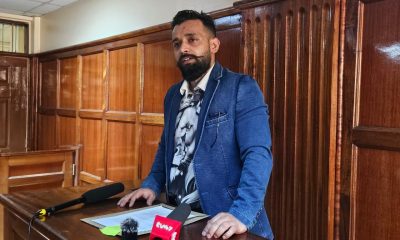Business
Uhuru-Linked Bank: Court Quashes Tax Exemptions for NIC-CBA Merger, Preventing Sh7B Tax Evasion
Former Treasury CS Henry Rotich had exempted the transfer of CBA shares into NIC Bank from a 1% stamp duty on the unquoted stocks involved in the share swap.

The NCBA Group, linked to former President Uhuru Kenyatta’s family, has suffered a legal setback after a court ruled that the 2019 tax exemption granted for the merger of NIC Group and Commercial Bank of Africa (CBA) was unconstitutional, preventing over Sh7 billion in potential tax evasion.
In a ruling delivered on Friday, July 4, 2025, the court overturned Legal Notice No. 112 of June 2019, which had exempted the banks from certain taxes during the merger.
Justice Chacha Mwita said the decision to exempt that bank, whose top owners are families of Jomo Kenyatta and Philip Ndegwa, from paying the stamp duty following the merger was not made in public interest.
“Having considered the issues raised, I come to the conclusion that the exemption was not made in public interest and thus violated the principle in section 106 of the Stamp Duty Act, so that the discretion conferred by that section was not properly exercised,” said the judge.
The judge said the interest exhibited in the letter from the bank, seeking exemption, was more private than in public interest.
Busia County Senator Okiya Omtatah, who filed the case, hailed the decision as a major victory for Kenya, stating that it saved taxpayers billions of shillings.
“In this legal battle, I exposed an attempt by these banks to evade over Sh7 billion in taxes through a merger that would have allowed them to avoid their rightful tax obligations, with NCBA Bank and Standard Chartered central to the transaction,”Omtatah said.
The exemption, granted by the National Treasury, bypassed legal procedures. During former President Kenyatta’s administration, the Treasury had waived a Sh350 million share transfer tax for the merger.
The Kenyatta family held a significant stake in CBA, while the NIC Group—listed on the Nairobi Securities Exchange—was controlled by the wealthy Ndegwa family. The merger created one of the largest financial services groups in the region.
Court Case
Omtatah argued that the Treasury’s decision to exempt the merger from taxes was “secretive and opaque,” contending that former Treasury Cabinet Secretary Henry Rotich lacked the authority to arbitrarily grant such a waiver.
“The taxpayer stands to lose an estimated Sh350 million in tax revenues that should have gone to public coffers,” he stated in his application.
He sued the Treasury Cabinet Secretary and the Attorney General, with NIC and CBA listed as interested parties.
Law Permits Tax Waivers
However, John Gachora, NCBA Group Managing Director, defended the waiver, insisting it was lawful.
“Transactions of this nature are provided for in law,” Gachora said during an interview on a local station in February 2.
“The waiver benefited not just NCBA but the 26,000 shareholders behind the merging banks.”
Gachora dismissed claims of preferential treatment, stating that NCBA—where the Kenyatta family retains a significant stake—has been tax-compliant.
“In the same year we received the Sh350 million waiver, we paid Sh4.4 billion in taxes—more than ten times the disputed amount,” he said, adding that NCBA remains one of Kenya’s largest taxpayers, having paid Sh6.7 billion in 2021 and Sh14.3 billion last year.
“Sh350 million is negligible in the context of our total tax contributions,” Gachora said. “Should the court rule against us, we will promptly pay the amount the following day.”
Political Backlash
Before the merger, NIC and CBA operated independently in banking, stock brokerage, and other sectors across Kenya and Tanzania.
The tax waiver became a political issue during the 2022 election campaigns, with President William Ruto and former Deputy President Rigathi Gachagua accusing Kenyatta—then backing Azimio leader Raila Odinga—of using his influence to secure the deal.
They framed it as part of systemic “state capture” under the previous administration, allegations Kenyatta denied.
“Through a single gazette notice, two companies tied to the First Family were exempted from paying Sh350 million—enough to build 35 Level 3 hospitals,” Gachagua claimed ahead of the 2022 polls.
The current administration had pledged stricter tax reforms and a crackdown on evasion.
“We cannot tolerate a system where the powerful exempt themselves from taxes. Their time is up—every citizen must pay their fair share,” Gachagua had said during their campaigns.
Former Treasury CS Henry Rotich had exempted the transfer of CBA shares into NIC Bank from a 1% stamp duty on the unquoted stocks involved in the share swap.
The merger was expected to enhance NCBA’s profitability by cutting costs across its regional operations.
The court’s decision to quash the tax exemption comes at a time when NCBA no longer enjoys the full regime protection that initially secured them the tax relief. With former President Uhuru Kenyatta now at odds with the current administration, this ruling may represent the fulfillment of a pledge to dismantle the preferential treatment NCBA received during his tenure—and could signal more such actions to follow.
NCBA has since announced that it will appeal the High Court’s decision.
Kenya Insights allows guest blogging, if you want to be published on Kenya’s most authoritative and accurate blog, have an expose, news TIPS, story angles, human interest stories, drop us an email on [email protected] or via Telegram
-

 Grapevine2 weeks ago
Grapevine2 weeks agoRussian Man’s Secret Sex Recordings Ignite Fury as Questions Mount Over Consent and Easy Pick-Ups in Nairobi
-

 News1 week ago
News1 week agoTHE FIRM IN THE DOCK: How Kaplan and Stratton Became the Most Scrutinised Law Firm in Kenya
-

 Investigations1 week ago
Investigations1 week agoMulti-Million Dollar Fraud: Three Kenyans Face US Extradition in Massive Cybercrime Conspiracy
-

 Economy1 week ago
Economy1 week agoIran Demands Arrest, Prosecution Of Kenya’s Cup of Joe Director Director Over Sh2.6 Billion Tea Fraud
-

 Business1 week ago
Business1 week agoA Farm in Kenya’s Rift Valley Ignites a National Reckoning With Israeli Investment
-

 Africa2 weeks ago
Africa2 weeks agoFBI Investigates Congresswoman Ilhan Omar’s Husband’s Sh3.8 Billion Businesses in Kenya, Somalia and Dubai
-

 Grapevine4 days ago
Grapevine4 days agoA UN Director Based in Nairobi Was Deep in an Intimate Friendship With Epstein — He Even Sent Her a Sex Toy
-

 Politics2 weeks ago
Politics2 weeks agoSifuna, Babu Owino Are Uhuru’s Project, Orengo Is Opportunist, Inconsequential in Kenyan Politics, Miguna Says




























